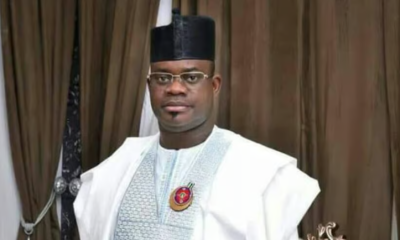THE Court of Appeal, Lagos Division at the weekend upheld the appeal filed by the Economic and Financial Crimes Commission (EFCC) against a Lagos High Court verdict which dismissed the alleged N25.7bn theft charge against former Keystone Bank (former Bank PHB) Managing Director, Francis Atuche.
A Justice of the Lagos High Court, Justice Lateef Lawal-Akapo, had in June 22 ruled that it lacked jurisdiction to entertain the suit and the prosecution’s case lacked. He subsequently discharged Atuche of the theft charge along with his wife, Elizabeth, and a former Chief Financial Officer of the bank, Ugo Anyanwu.
However, while delivering judgment on the appeal filed by the EFCC, Justice Gana Mshella, set aside the judgement, saying the trial judge erred in law by holding that it was bound on the principle of Stare decisis by the decision in Okey Nwosu Vs Federal Republic Nigeria and Akingbola Vs Federal Republic of Nigeria.
She held that the lower court erred when it struck out counts 1 to 24 and 26 in the amended information against the third defendant. Justice Mshella subsequently ordered the Chief Judge of Lagos State to reassign the case to another judge or retrial.
Recall that Justice Lawal-Akapo had in June 22 ruled that EFCC application dated November 27, 2013 lacked merit, ordering that the criminal charge against the defendants be struck out. “The complainant’s notice of plenary objection dated December 3, 2013 is hereby dismissed”, Justice Lawal-Akapo had declared.
Not satisfied with the judgement, EFCC filed an appeal in June 1, 2011 through its counsel, Kemi Pinheiro (SAN), seeking an order of the Court of Appeal setting aside the order of Justice Lawal-Akapo.
Other reliefs sought by the EFCC include an order allowing its appeal and an order directing a continuation of trial and defence before Justice Lateefa Okunnu of the High Court of Lagos State sitting in Ikeja.
ALSO SEE: EFCC freezes Patience’s N5 million, digs deeper for more
The EFCC, which based its appeal on five grounds, told the court that the learned trial judge erred in law by proceeding to strike out the entirety of the amended information when by the unambiguous and plain provisions of Section 252(3) of the Constitution, no exclusive criminal jurisdiction is conferred on the Federal High Court (at least to the exclusion of the Lagos High Court) on the matters provided for under Section 251(1).
The commission contended that it was wrong for the court to strike out counts 1 to 24 and 26 in the amended information against the third defendant when the order of the Court of Appeal against which he claimed the lower court assumed jurisdiction over the charge was in respect of the appeals initiated by the first and second appellants only stressing that the third defendant was not a party to it.
He said neither the third defendant nor his counsel made any application before the court seeking to have counts 1 to 24 and 26 of the amended information struck out. He said the court, by so doing, has become charitable by granting relief and order not sought for by the third defendant.
The EFCC submitted that the defendants pleaded separately each of the counts contained in the amended information to the main suit. It explained that counts one to 10 dealt with the alleged stealing of money belonging to the bank while count 11 to 27 dealt with the allegation of conversion of the monies to personal use.
It said the court ignored the provisions of Section 152 and 153 of the Administration of Criminal Justice Law 2011 by striking out all the counts against the defendants.
The EFCC contended that the trial judge erred in law by holding that it was bound on the principle of stare decisis by the decision in Okey Nwosu Vs Federal Republic of Nigeria and Akingbola Vs Federal Republic of Nigeria.
It said the decision of the Court of Appeal in Ehindero Vs Federal Republic of Nigeria and Sebastian Adigwe Vs Federal Republic of Nigeria affirmed the non-exclusivity of the criminal jurisdiction of the Federal High Court.
The EFCC contended that where there are two or more conflicting decisions of a higher court or the Court of Appeal, the law stipulated that the lower court is at liberty and free to choose which of the decisions to follow and cited the cases of Eze Vs Attorney General Rivers State, Ikweki Vs Ebele and Mohammed Vs MECO Limited to support his claim.

 Health5 days ago
Health5 days ago
 Entertainment6 days ago
Entertainment6 days ago
 Education7 days ago
Education7 days ago
 Crime5 days ago
Crime5 days ago
 Health7 days ago
Health7 days ago
 Comments and Issues6 days ago
Comments and Issues6 days ago
 Football6 days ago
Football6 days ago
 Latest6 days ago
Latest6 days ago













